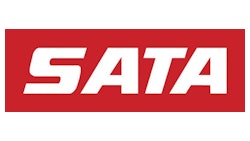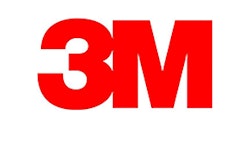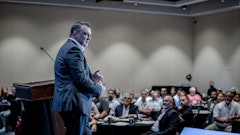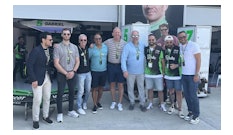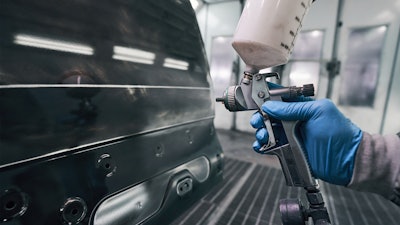
HOW REFINISH INNOVATION IS DRIVING SUSTAINABILITY IN COLLISION REPAIR
“At SATA, sustainability is not just a goal—it is a guiding principle shaping every aspect of our operations.”
— Joern Stoever, Global Key Account Manager
Sustainability is no longer a buzzword in collision repair—it’s fast becoming a business imperative. Today’s collision repair facility owners and managers face growing pressure from regulators, insurers and customers to reduce their environmental footprint. Nowhere is that shift more apparent than in the refinish segment, where products, tools and processes have evolved dramatically to support greener operations—often while improving productivity and profitability.
Suppliers, manufacturers and technology partners are rethinking the materials and methods used in modern refinishing. From low-VOC coatings to energy-efficient processes and smarter equipment, the future of sustainable collision repair is being written — one coat at a time.
PRODUCTS BUILT FOR PERFORMANCE AND PLANET
For suppliers, innovation in coatings is leading the way. Low-VOC and waterborne technologies now dominate the conversation — proving that environmentally responsible doesn’t mean compromising on quality. Fred Daoust, Country Manager–AkzoNobel Canada, is clear on the balance between sustainability and performance. “Our products meet today’s requirements, but we’re always looking ahead. We want our products to support greater process speed, energy savings and carbon footprint reduction — ultimately leading to greater profitability and sustainability,” he says, pointing to the company’s latest wet-on-wet waterborne basecoat launching in Canada.
The move toward greener coatings has been years in the making according to Patrice Marcil, Global Training Director for Axalta Refinish.
“We introduced the first refinish low-VOC waterborne basecoat in the 1990s,” says Marcil. “Today our waterborne coatings meet stringent environmental standards and provide better coverage than conventional products.”
Automation in the mixing room is reshaping the technician’s role and reinforcing operational efficiency. Technicians are now playing a key role in advancing sustainability objectives within repair shops. Michelle Deemer, Global Communications Director of PPG explains that their PPG MOONWALK® automated mixing system is revolutionizing the refinishing process.
“It saves labor time, reduces waste, and transforms the mixing room into a clean and safe environment,” she says. “Our Envirobase® High Performance paint system works with PPG MoonWalk® to help shops meet their sustainability goals while improving efficiency.”
Patrice of Axalta points to their newest tool in the fight against waste. Launched in 2023, Axalta Irus Mix is also a completely hands-free refinish paint mixing machine. “It is underpinned by four key attributes: time advantages, labour optimization, consumption advantages and environmental thoughtfulness. Axalta Irus Mix is designed to deliver highly-accurate colour while minimizing environmental impact to help collision repair shops meet key business goals.”
3M is also rethinking product development with sustainability at the core. Gayle Schueller, Senior Vice-President and Chief Sustainability Officer, says every new product is tied to a specific sustainability commitment. “This could mean processes that reduce carbon footprint or materials that improve end-of-life options. By leveraging our 49 technology platforms, we’re advancing circular economy solutions while meeting customer needs.”
Spray equipment manufacturers like SATA are equally focused on embedding sustainability into their designs. As Joern Stoever, Global Key Account Manager, explains, “At SATA, sustainability is not just a goal—it is a guiding principle shaping every aspect of our operations.”
PROCESS IMPROVEMENTS DELIVER GAINS AT EVERY STEP

AkzoNobel’s RETHINK Body Shop Sustainability initiative, launched for Sikkens customers, is a prime example. “We’ve developed a proprietary CO₂ calculator, certified by Carbon Neutral Repair,” says Daoust. “It measures emissions at every step of the painting process and recommends Sikkens products that reduce environmental impact.”
Waste-reduction strategies are also helping shops cut material use and improve profitability. At SATA, this mindset extends from product design to manufacturing. Stoever emphasizes, “We are deeply committed to sustainability across economic, environmental and social dimensions. Our goal is to minimize environmental impact by optimizing product performance from generation to generation, ever improving efficiencies in the painting process.”
Equipment upgrades are delivering measurable improvements, particularly in the booth. Heated nitrogen systems are one example, offering better finishes with fewer emissions. Derek Naidoo, President of NitroHeat, explains: “By using heated nitrogen instead of compressed air, our systems improve transfer efficiency, minimize overspray and reduce VOC emissions.”
That change isn’t just better for the environment — it helps shops operate more efficiently. “The absence of moisture means a cleaner, higher-quality finish with less need for buffing and sanding. Faster flash times improve cycle times — all while lowering material waste,” Naidoo adds.
“Today, coatings — continue to offer bodyshops advanced, environmentally thoughtful solutions. The one-visit application also allows repairers to reduce the booth cycle time and reduce their electrical and gas consumption.”
— Patrice Marcil, Global Training Director, Axalta Refinish
TRAINING TECHNICIANS FOR SUSTAINABLE REPAIRS

That’s why training has become an essential pillar of sustainability strategies—ensuring refinishing professionals can apply innovative solutions effectively and consistently. Paint companies have developed comprehensive programs to help technicians keep pace with new technologies and embed sustainability directly into their workflows.
A sample curriculum from PPG includes:
• Sustainable Practices Module covering low-VOC products, sustainably advantaged materials, and responsible sourcing
• Environmental Impact Education on the risks of traditional materials versus sustainably advantaged alternatives.
• Product Usage Training focused on labels, certifications, and proper application techniques.
• Waste Management Training teaching best practices for minimizing waste and handling hazardous materials responsibly
• Resource Efficiency Techniques for calculating accurate material needs and reducing overuse.
• Sustainability Certification Programs to formally recognize technicians trained in advanced, responsible refinishing methods.
• Continuous Education through webinars, online courses, and regularly updated technical resources.
• Networking Opportunities connecting technicians to share challenges and solutions related to sustainability and shop performance.
“Providing this kind of training and resources is key to ensuring painters understand the broader environmental impact of their work and feel confident integrating sustainably aligned technologies into their day-to-day operations,” says Deemer.
SUSTAINABILITY IS YOUR COMPETITIVE ADVANTAGE

“Sustainability is about future-proofing your business,” Naidoo concludes. “Shops that embrace these changes now will gain efficiency, profitability and a reputation as leaders in responsible repair.”
For Canadian shops, sustainable refinishing isn’t just the future— it’s happening now. Those ready to lead will be better positioned for longterm success in a competitive, fast-evolving industry.



